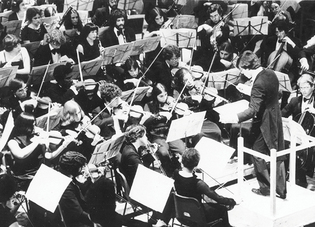
Members of the ’77–’78 Yale Symphony Orchestra, performing at the Farnham Maltings in England. (Kathrin Day Lassila is the blond violinist at left.) Many went on to outstanding musical careers, including conductor Rob Kapilow ’75, the late Bill Bennett ’78, David Abell ’81, and Artemis Simerson (at Kathrin’s right).
Share your own YSO memories in the comments below.
View full image
You can’t foresee where music will take you. In June 1978, it took me onto the ocean liner Queen Elizabeth II, straight into rough seas and colossal waves.
It was the summer after my first year at Yale. I was a second violinist in the undergraduate Yale Symphony Orchestra, and we’d just finished a tour of the UK. In return for playing an onboard concert, we had a free ride home on what was then one of the grandest and most famous ships in the world.
Grandeur, however, can’t change the weather. Ninety-some students and our conductor, Rob Kapilow ’75—not to mention virtually all the other passengers—were holed up in their cabins, green with seasickness, waiting for the ship’s medics to bring them Dramamine. But nausea works in mysterious ways. A cellist, another violinist, and I were completely immune. For us, the ship had become an amusement park. Whenever the QEII crested a wave and then plunged back downward, gravity almost disappeared. We spent much of an afternoon running through empty hallways and up and down the ship’s main stairwell, just to feel the incredible sensation of floating. It was the closest I’ll ever come to having wings.
But the best part of the trip had been our travels through Britain by bus. We saw the Houses of Parliament, the colleges of Oxford, the ruins of Coventry Cathedral. We walked on Hadrian’s Wall. We were hosted by generous British families.
Most importantly: we played music. We’d taken our final program of the spring semester—Elgar, Barber, Copland, and Tchaikovsky—on the road. Sightseeing was only a sideline to our travels from one concert hall to the next. At the Royal College of Music in London, we met US diplomat and former Yale president Kingman Brewster Jr. ’41; he joined us onstage to deliver the texts Copland had chosen to accompany his Lincoln Portrait music. Afterward, Brewster held a reception in his ambassadorial residence. There we met William Waite ’51, known as the founder of the YSO. (Also, several tuxedoed students drank impressive quantities of gin.)
Not all the places we played in were so imposing. One was a brewery-turned-cultural center called the Farnham Maltings, about an hour south of Oxford. The concert hall was small, and the raised stage looked alarmingly skeletal. It consisted of large pieces of wood flooring held up by steel pipes and two-by-fours. To get to our seats, those of us wearing long black skirts had to climb gingerly from one level to the next, carefully avoiding the gaps in between.
But on that makeshift, crowded, awkward stage, something happened that I’ll never forget. The finale of our concert, Tchaikovsky’s Symphony no. 6, came more intensely alive to me than ever before. When played right, the anguished final movement is one of the most profoundly moving pieces of music in the classical orchestral repertoire. And “playing right” is more than technique or dynamics. Music is emotion; music should take you into depths and onto heights. I’d never felt the joys and suffering of Tchaikovsky’s last symphony so deeply, and I’d never played my own part in it so well.
Why should a student orchestra tour? I posed that question to the current YSO director, William Boughton, who is working to build an endowment for the orchestra so that every student, no matter how financially strapped, can take part. (See yso.yalecollege.yale.edu.) We agreed on all points: a student orchestra tours to learn about the lives of professional orchestral musicians. To play with other young musicians abroad. To see a new part of the world and another culture—especially valuable for those who’ve never had the chance to travel.
And crucially, touring allows a student orchestra to devote extended attention to music that would otherwise get just one shot in front of an audience. When you perform a piece onstage several times over, you grow, mentally and musically. I’m sure that’s why I was able to play with such feeling at the Maltings. And I’d give a year off my life to play Tchaikovsky’s Sixth in a fine orchestra again.
 loading
loading